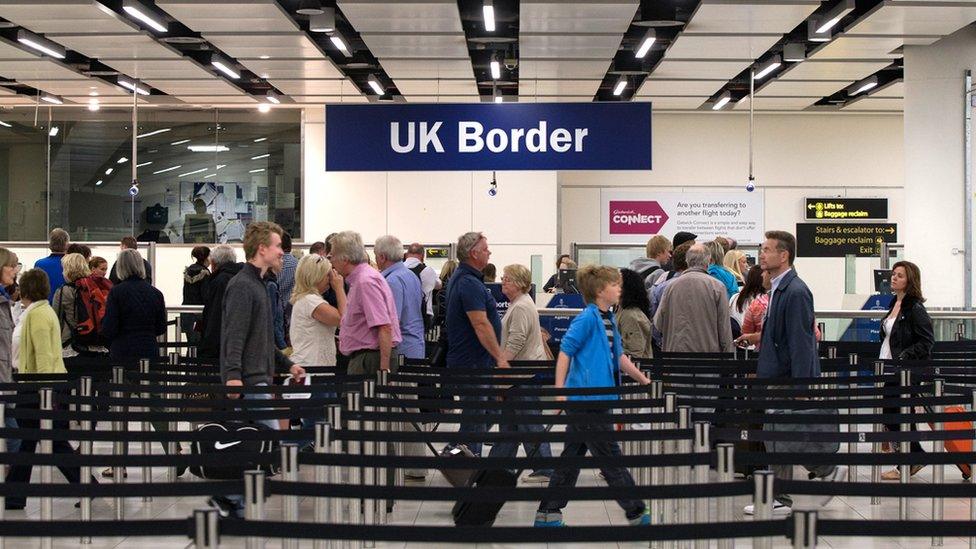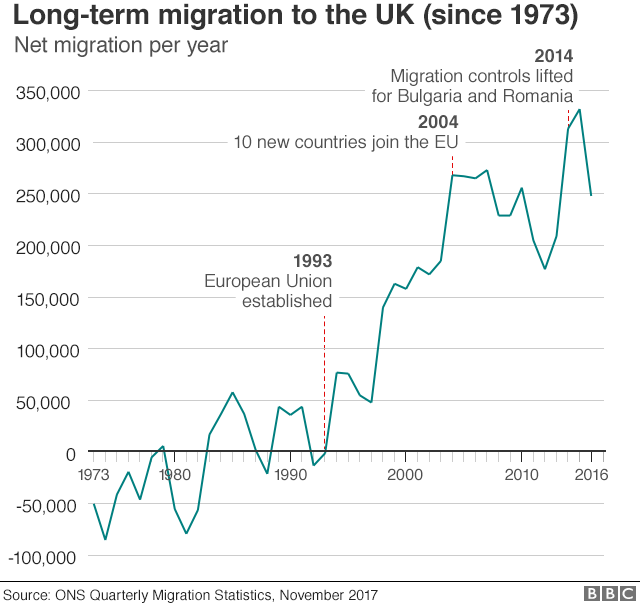Net migration falls by more than 100,000 after Brexit vote
- Published
- comments

Net migration is estimated to have fallen by nearly a third to 230,000 in the year to June, new figures show.
It is the first time that a full year of data has been available since the UK voted to leave the EU last June.
The figure is still short of the Conservatives' target to reduce net migration to the "tens of thousands".
Net migration is the difference between people coming to the UK for more than a year, and the number of people leaving the UK for a year or more.
In this 12-month period, 572,000 people arrived in the UK, and 342,000 emigrated, the Office for National Statistics report, external showed.
Immigration specifically fell by 80,000 people over the year - and three-quarters of that drop was down to fewer EU citizens coming to live in the UK, figures showed.
Nicola White, head of migration statistics at the ONS, said: "The decline follows historically high levels of immigration and it is too early to say whether this represents a long-term trend."
She pointed to figures showing the number of people coming to the UK for a definite job has remained stable but those coming to "look for work", especially EU citizens, was down 43%.
"These changes suggest that Brexit is likely to be a factor in people's decision to move to or from the UK - but decisions to migrate are complex and other factors are also going to be influencing the figures," she added.

Immigration minister Brandon Lewis said the UK was still a country able to attract the "brightest and the best".
With more Europeans continuing to arrive than leave, these figures showed that claims of a "Brexodus" were misguided, he said.
He added that his focus was on making sure businesses have access to the skills needed from Europe and around the world; ensuring a controlled immigration system and making sure people were in the UK legally, being an important part of the economy and communities.
Citizenship applications
The ONS said the 106,000 fall on the previous year's net migration figure was the largest annual decrease recorded.
This was substantially down on its high of June 2016 and now at similar levels to 2014, the ONS said.
The figures also showed:
The number of non-EU citizens leaving the UK has remained stable over the past year - but the number of EU citizens, including British-born people - who have chosen to leave has increased by almost a third
Applications by EU nationals to become British citizens were up by 80%
BBC home affairs correspondent Dominic Casciani said there was a combination of factors at play.
"Anecdotally you pick up the fears around the Brexit effect," he said.
But the economic effects and the falling value of the pound might also be a factor, for example a Polish worker would get six zloty for every pound earned before Brexit.
That's fallen by a quarter since the referendum, he added.

Professor Jonathan Portes, of King's College, London, who works for the research group UK in a Changing Europe, said the statistics showed the country has become a "less attractive place for European migrants".
"Whatever your views on the impact of immigration, it cannot be good news that the UK is a less attractive place to live and work, and that we will be poorer as a result," he said.
Lord Green of Deddington, chairman of Migration Watch UK, said the figures showed a "very welcome reduction in net migration - especially by EU citizens who do not have a job to come to".
"It points to what could be achieved once the UK regains full control over migration," he added.
The Conservatives' aim since 2010 has been to reduce net migration to below 100,000.
The pledge to reduce net annual migration to the "tens of thousands" was in the 2010, 2015 and 2017 Tory manifestos.
Neither Prime Minister Theresa May nor her predecessor, David Cameron, have come close to meeting that target.

- Published30 November 2017